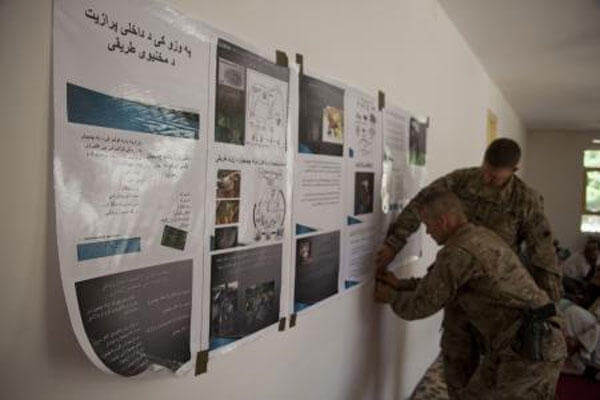CAMP LEATHERNECK, Afghanistan — Despite sweltering heat, many Afghans in Helmand province can be found working in their fields during the day.
During those hot days, district government officials are often working with U.S. soldiers from the Georgia Agricultural Development Team III to improve their agricultural and business knowledge.
The soldiers, who work in 6-8 man adviser teams, provide the Afghan officials, known as agricultural extension agents, with classes on irrigation, pest management and seed quality. After the classes, the extension agents teach the classes to local Afghan farmers.
“We’re not giving away anything that costs money,” said Capt. Hubert Thompson, the Agricultural Team officer-in-charge. “We’re providing knowledge and training.”
The Georgia ADT III is comprised of more than just agricultural specialists, from infantrymen who provide security for the teams to carpenters and repairmen who have helped improve living conditions across Helmand province.
While the soldiers focus on teaching, the Afghans are eager to learn.
“They are very receptive to the training,” said Thompson, a native of Canton, Ga. “They want to learn and they’re open to new ideas and techniques.”
The soldiers also provide reading material in Pashto to help the government officials learn more about agriculture through study.
Along with farming principles, the agriculture teams are teaching classes on beekeeping—a cost effective and useful trade, Thompson said.
Bees are good pollinators for farmers and the many products that can be produced from their wax and honey can be used by the Afghans or sold at local markets.
“This initiative provides the youth tools and information to develop their own source of income as well as have an immediate contribution that will aid family self-sustainability,” said Staff Sgt. Juan Solano, a civil affairs Marine with RCT-7.
Local markets are an important part of what the ADT III is working to accomplish within the districts, Thompson said. Their plan is to move farmers to a point of growing enough food for their families and have surplus that can be sold as part of the local economy.
“We’re trying to get them to do some forward thinking,” Thompson said. “We’re building their confidence and they’re going out and being successful.”
The soldiers are also working with the Afghan officials to develop good business practices like forecasting expenses and balancing a training budget.
The teams have had many successes since January, Thompson said. In one district, a local school teacher is teaching children agricultural classes. The Afghans have also taken the idea of a chamber of commerce and put it into practice.
The soldiers work hard to contribute knowledge to the Afghans with each meeting and plan to continue working with the Afghans for a better tomorrow.
“Sometimes we just give them a basic idea,” Thompson said. “Once the Afghans step in and take over, then we did our job.”






























